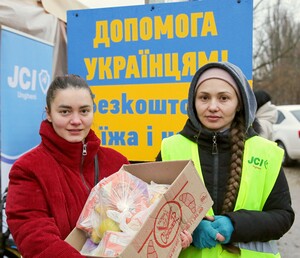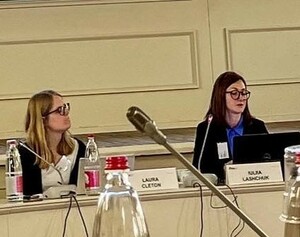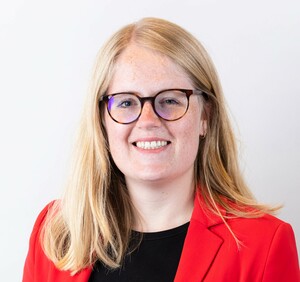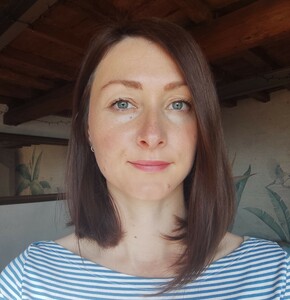
A scene from the border crossing between the Republic of Moldova and Romania as refugees from Ukraine flee the war in Ukraine. (Photo: UN Women)
A post by Laura Cleton, researcher at UNU-MERIT.
Today, 8 March, is International Women’s Day: a global day celebrating the social, economic, cultural and political achievements of women. It also marks a call to action to educate and raise awareness for women’s equality and call for positive change advancing the position of women.
At UNU-MERIT, researchers on migration and development – including myself – do so by pointing to the gendered nature of international migration and developmental impacts. Gender scholars argue that phenomena like migration are inherently gendered: not just because of their differential impacts on women and men, but also because gendered identities and power structures shape migration decision-making, migratory experiences and the way policies construct and act upon international migrants.[1] This similarly counts for situations of conflict, where responses to refugee migration are impacted by gender roles, identities and relations.
After the outbreak of Russia’s full-scale invasion of Ukraine on 24 February 2022, UNU-MERIT joined forces with Maastricht University, the Migration Policy Centre (European University Institute, Florence) and the Centre of Migration Research at the University of Warsaw to establish the Research Network on Ukrainian Migration. This network documents patterns of migration within, to and from Europe more generally. One of the ways it does so is by tracking public attitudes and policy developments over time and collaborating with displaced scholars from Ukraine.
One of those scholars is Iuliia Lashchuk, Max Weber Postdoctoral Fellow at the Robert Schuman Centre for Advanced Studies at the European University Institute. Iuliia is part of our Research Network on Ukrainian Migration and researching the situation of Ukrainian women on the move in Europe. For this year’s International Women’s Day, I interviewed Iuliia to celebrate her important research and raise awareness of the gendered nature of the ongoing conflict.

Laura and Iuliia at the conference ‘Assessing the situation in the EU for Ukrainian women displaced by war‘, 24 February 2023
Laura: Thank you so much for taking time to talk to me today, Iuliia. How exactly did you come to research the topic of gender and forced migration?
Iuliia: I am a cultural theorist and a philosopher by training. During my work, I became interested in ‘Otherness’ and the attitudes toward ‘the Other’, on themes like hospitality or hostility, care, etc. I was asking myself: Who are those ‘Others’ of our contemporary world, and why do ‘We’ (and who are those ‘We’?) treat them in certain way? I realized that an extreme form of ‘Otherness’ today concerns female migration, because women get excluded and marginalized for being both a migrant and a woman. I wanted to center my theoretical research on a very concrete case study. As a Ukrainian myself, I chose Ukrainian female migration after 1991. After February 2022, this topic became even more acute, so currently I am in fact researching myself. Yet I always do my work with all women in mind, not just Ukrainian women.
Laura: Why is it important to study forced displacement – and policy responses to it – following the war in Ukraine from a gender angle?
Iuliia: Women and girls often experience migration or forced displacement differently than men and boys. During conflicts and wars, as well as while fleeing violent situations, women might face specific forms of violence such as sexual violence, trafficking, and exploitation. They may also be responsible for the care of children and elderly family members, which can limit their access to labour market and socialisation. We should keep in mind that almost 90% of those fleeing the war in Ukraine are in fact women with children. Displaced women and girls may face intersectional discrimination based on their gender, refugee experience, social status, age, race, sexual orientation, etc. Such compounded discrimination often limits their access to education, healthcare, integration, as well as their well-being in general. These inequalities in turn might have negative impact on their ability to recover and rebuild their lives.
But we should remember that displaced women are not only victims, and we should not see them as victims. Of course, they are vulnerable, but they also display a great sense of agency. They are often active agents of change in their communities and serve as mediators. The Ukrainian diaspora in Europe and beyond also plays a crucial role here. By involving women in decision-making processes and ensuring that their voices are heard, policymakers can design more effective and sustainable interventions to address the needs of displaced populations.
Laura: For which policy sectors in particular do you feel that a gender angle is crucial and not to be missed – and why?
Iuliia: I always emphasize the fact that in every migration project, vulnerability and empowerment happen simultaneously. Gender sensitivity is crucial in all policy sectors, as gender impacts all aspects of our lives. However, some policy sectors where a gender angle is particularly important and not to be missed include:
- Access to reproductive health services, especially in cases of countries like Poland where there is almost a total abortion ban and thereby a constant violation of women’s reproductive rights.
- The issue of housing, as we know from ongoing research that only 43% of refugees from Ukraine live in rented accommodation, 26% of them are staying at temporary hosted accommodation, and almost everyone else is staying at collective sites or reception centers. In these centers, they do not have any privacy and face higher risks of becoming exposed to gender-based violence.
- Gender equality on the labor market. Migrant women face unique challenges in accessing economic opportunities and are more likely to work in low-paying, unstable jobs. Many Ukrainian female refugees with whom I spoke mentioned receiving unfair pay and facing verbal abuse and harassment in their workplaces.
This must be changed. While my research center focuses on Ukrainian women in particular, we know from other academic research that refugee women more broadly face these issues on a structural basis.
Laura: As you know, the theme of this year’s International Women’s Day is “DigitALL: Innovation and technology for gender equality.” What is the role of technological innovation for female refugees from Ukraine?
Iuliia: Digitalization in fact played a very important role in the war and the situation of displacement. Firstly, in Ukraine the IT sector is very well developed. Everyone who has a smartphone probably has an application called Diya. In this app, Ukrainians store copies of their ID documents, driver licenses, Covid certificates… literally everything we might need. As many women had to flee their homes in pajamas, without having time to find their passports or other documents, Diya helped a lot.
But of course, during the first weeks of the full-scale invasion, groups on social media platforms like Facebook, Telegram and Viber popped up. These groups were used not only for communication and information, but also for support. “Women to women” groups on social media emerged all over Europe, such as Sunflower Sisters on Facebook or Martynka on Instagram. These were and still are platforms of incredible support and solidarity between women of different nationalities fleeing the war. In those groups, women ask for help, get advice, find female (and therefore safer) sponsors for governmental programs (which is a requirement in some non-EU countries). I call this kind of support digital sisterhood, and it really works well.
Laura: Those sound like great initiatives indeed. Thanks so much for bringing them to our attention. As a final question: What is the one message that you would like to bring across this International Women’s Day?
Iuliia: I would like us all to remember that more than 50,000 women currently serve in the Ukrainian military. Many of them are involved in combat operations. They are fighting and dying not only for freedom, democracy and humans rights, but also for equal opportunities for men and women, even on the battlefield. Those women are my heroes. The same as those who volunteer, bring their children to Europe to save their lives, do research, teach, invent, create art, clean Ukrainian cities of Russian missiles, take care of children, elderly people, animals… Those women are brave, they are powerful, and they prove every day that women can do everything.
Laura: Thank you so much for talking to us today, Iuliia. All the best with the important work that you are doing!
Reference:
[1] Bonjour, S. & L. Cleton (2021), “Gendered Migrations: A Gender Perspective on International Migration and Migration Politics”. In Money, J. and S.P. Lockhart (eds). Introduction to International Migration: Population Movements in the 21st Century, pp. 127-148. London: Routledge.
ANY COMMENTS?
NOTA BENE
The opinions expressed here are the author’s own; they do not necessarily reflect the views of UNU.
MEDIA CREDITS
UN Women; Maastricht University/Philip Driessen





